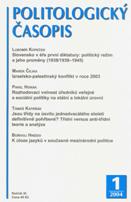Holocaust, Izrael a židovská identita
Holocaust, Israel and the Jewish Identity
Author(s): Pavel BaršaSubject(s): Politics / Political Sciences
Published by: Masarykova univerzita nakladatelství
Keywords: holocaust; Israel; Jewish identity
Summary/Abstract: Are the Jews an ethno-religious group or a nation with the right to self-determination? This was an open issue at the turn of the 19th and 20th century. In the wake of Holocaust and of the establishment of the modern Israel, the answer became much more determinate, even if – due to the split between Israeli and Diaspora Jews – still not unambiguous. The Eichman abduction and trial in 1960 – 62 and the victorious war with the Arabs in June 1967 offered new opportunities for the reconstruction of the Jewish identity in view of both the unprecedented catastrophe of the Jewish people and the subsequent resurrection of its statehood. Gorny elaborates two ideal types of the Jewish self-conception that followed from two opposite interpretations of Holocaust and of the foundation of Israel. Post-zionism gives these two events a universalistic reading, neo-zionism (or ultra-zionism) a particularistic one. The two interpretations imply two competing versions of the Jewish identity; one is open towards the world and other peoples, the other focuses exclusively on the Jews. Accordingly, two different approaches towards the Palestinians follow; one seeks to understand their grievances and to find a compromise, the other relies on the brute force and remains intransigent. Even tough the book was published two years before the second Intifada broke out, Gorny’s ideal-typical dichotomy still offers the best access to deep sources of the current predicament of the Jewish identity and Israeli politics.
Journal: Politologický časopis - Czech Journal of Political Science
- Issue Year: XI/2004
- Issue No: 1
- Page Range: 78-87
- Page Count: 9
- Language: Czech

